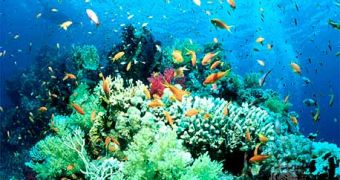A new study shows that, as long as their parents lived in similar conditions, newborn reef fish remain virtually unaffected by having to live in waters whose temperature and chemistry have been altered by climate change.
The study compared young anemonefish, whose parents had lived in normal water conditions, to offspring belonging to the same species and whose parents were made to swim in aquatic environments that had both elevated carbon dioxide levels and significantly higher overall temperatures.
Science News reports that Phillip Munday, one of the researchers involved in this study, argued that “We thought there might be some cost to the parents from this high CO2. The changed conditions might have sapped the parents’ energy or triggered stress reactions that led to smaller, less hardy babies.”
However, as he goes on to explain, “31 days after hatching, young anemonefish growing up under the experiment’s most extreme temperature and pH exhibited comparable in weight, length and survival to those raised in present-day conditions.”
The same source informs us that this phenomenon of parents' passing on to their offspring certain traits that might help them survive in various environmental conditions, without the need for genetic change, is known as transgenerational plasticity.
This means that, in spite of issues such as ocean acidification and global warming, there might still be a chance for our marine ecosystems to somehow pull through.
However, even if some marine animals do in fact develop ways of adapting to living in continuous exposure to elevated carbon dioxide levels and higher-than-normal temperatures, the fact remains that the destruction of their natural habitat will eventually take its toll on them.
Thus, but for protecting our oceans, aquatic creatures will be left without hiding, breeding and hunting areas, and we highly doubt that they can succeed in living without said “facilities.”

 14 DAY TRIAL //
14 DAY TRIAL //